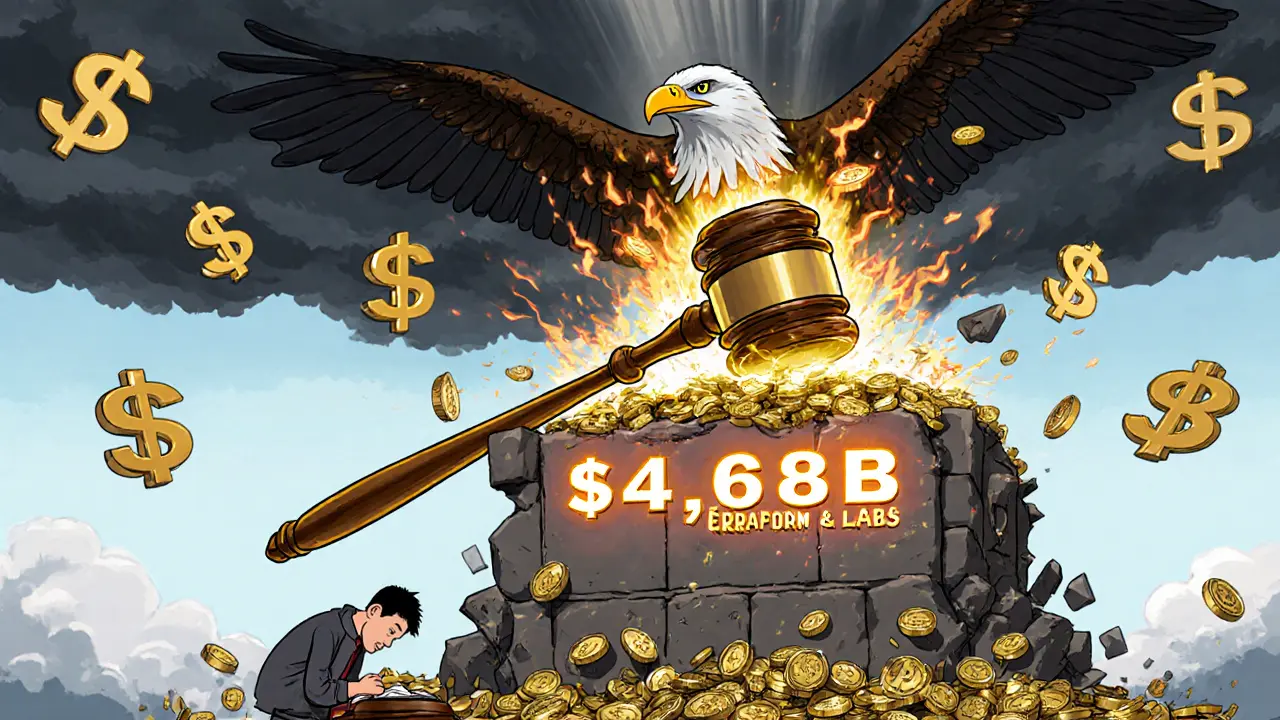SEC Crypto Fines Calculator
This calculator demonstrates the key point of the article: The $4.68 billion in SEC crypto fines in 2024 was dominated by one case. Enter values to see how the distribution affects the percentage.
Results
Based on your inputs, 100% of the total fines came from the Terraform Labs case.
The $4.68 billion fine against Terraform Labs represents nearly the entire $4.68 billion in SEC crypto enforcement penalties for 2024.
Key Takeaway: The article explains that this single case accounted for nearly the entire $4.68 billion total, demonstrating how the SEC's enforcement strategy shifted from widespread enforcement to focusing on high-impact cases like Terraform Labs.
The U.S. Securities and Exchange Commission (SEC) hit crypto companies with $4.68 billion in fines in 2024 - the largest single-year penalty total in its history. That number isn’t just big. It’s staggering. It’s more than the total fines the SEC handed out in the entire decade before 2023. And it wasn’t spread evenly. One case alone - the Terraform Labs and Do Kwon penalty - made up nearly the entire amount. This wasn’t just enforcement. It was a message. But here’s the twist: by mid-2025, the SEC had already started walking back much of what it built up.
Why $4.68 Billion? It Wasn’t About a Dozen Cases
You might think the SEC filed hundreds of lawsuits to hit that number. They didn’t. In 2024, they brought only 33 enforcement actions - down 30% from 2023. So how did they collect over $4.6 billion? One case: Terraform Labs. Terraform Labs, the company behind the collapsed algorithmic stablecoin UST, was found guilty of selling unregistered securities and lying to investors about how their system worked. The SEC didn’t just fine them. They went after Do Kwon personally, tracking him across borders, and slapped him with a $4.68 billion penalty - the biggest ever against a crypto entity. That one number alone made up 100% of the year’s total. No other case came close. Not Ripple. Not Coinbase. Not even Binance, which settled with the Justice Department for $4.3 billion in 2023 but wasn’t part of the SEC’s 2024 total. The rest of the year’s enforcement was quiet. The SEC didn’t ramp up lawsuits. They didn’t chase small exchanges. They focused on one target: Terraform. And they made sure the world saw the price of ignoring securities laws.Who Was Behind the Push? Gary Gensler’s Legacy
Gary Gensler became SEC Chair in April 2022 and quickly made crypto his priority. Under his watch, the SEC treated almost every token as a security unless proven otherwise. They didn’t wait for Congress to act. They used the Howey Test - a 80-year-old legal standard for identifying investment contracts - to label tokens as securities. That meant any project selling tokens to raise money, even if they promised decentralization later, could be accused of breaking the law. Gensler’s team filed 63 enforcement actions between 2013 and 2024. Of those, nearly $6.05 billion in penalties came under his leadership - four times what the previous chair, Jay Clayton, collected. The agency built a special unit called the Crypto Assets and Cyber Unit, staffed with lawyers trained to go after token sales, DeFi protocols, and centralized exchanges. The timing of the 2024 actions was also telling. Half of the year’s cases were filed in September and October - right before the U.S. presidential election. Critics said the SEC was trying to make a political statement. Supporters said they were protecting investors before more money flowed into risky projects.The Shift: What Changed in January 2025?
On January 20, 2025, Gary Gensler stepped down. Two days later, Acting Chair Mark Uyeda announced a new direction. The SEC created the Crypto Task Force, led by Commissioner Hester Pierce - known in the industry as “Crypto Mom” for her long-standing support of clearer rules. They brought in Mike Selig, a former Wall Street lawyer, to lead legal strategy. The message was clear: the era of enforcement-first regulation was over. The task force’s goal? To build rules, not just punish. They didn’t want to scare companies out of the U.S. They wanted them to stay - but do it legally. By February, the SEC shut down the old Crypto Assets and Cyber Unit and replaced it with the Cyber and Emerging Technologies Unit (CETU). The new unit had fewer lawyers focused on crypto. Their mandate? Use enforcement resources more carefully. Not every violation deserved a billion-dollar fine.
The Coinbase Case: A Turning Point
The most visible sign of the shift came on June 11, 2025. The SEC and Coinbase filed a joint motion to dismiss the lawsuit the SEC had filed against the exchange in 2023. Coinbase had sued the SEC first, calling their approach “regulation by enforcement.” The dismissal wasn’t a win for Coinbase alone. It was a win for the entire industry. The SEC didn’t say Coinbase was innocent. They didn’t say their tokens were safe. They just said: we’re not going to fight this anymore. The new leadership decided the case wasn’t worth the cost - legally, politically, or economically. That decision sent shockwaves. Other exchanges stopped panicking. Startups paused their offshore moves. Investors breathed easier. It was the first time the SEC had dropped a major case against a top-tier crypto company since 2018.What’s Still Being Targeted?
Don’t think the SEC is gone. They’re just hunting differently. In April 2025, they charged Ramil and PGI Global with a $198 million fraud scheme involving fake crypto assets and foreign exchange scams. In May, they went after Unicoin Inc. for allegedly running a Ponzi-style token sale. These cases weren’t about registration. They were about lies, theft, and deception. The new SEC isn’t chasing technical violations. They’re chasing fraud. If you’re running a legitimate project, trying to comply, and being transparent - you’re not their target anymore. But if you’re promising returns you can’t deliver, hiding who’s behind the project, or stealing money - you’re still in danger.
What This Means for Crypto Projects Today
If you’re building a crypto product in 2025, here’s what you need to know:- Don’t assume your token is a security - but don’t assume it’s not either. The SEC hasn’t issued final rules yet.
- Be honest with users - no fake yield promises, no misleading whitepapers.
- Don’t rely on “we’re decentralized” - if you control the keys, the code, or the marketing, you’re still responsible.
- Start documenting compliance - even if the SEC isn’t asking, your investors will.
- Watch for new guidance - the Crypto Task Force is expected to release draft rules by late 2025.
The Bigger Picture: Regulation vs. Innovation
The SEC’s 2024 crackdown didn’t just scare companies. It pushed many overseas. Singapore, Switzerland, and the UAE saw a surge in crypto startups relocating from the U.S. The Oxford Business Law Blog warned this could hurt American innovation long-term. But the 2025 shift may be reversing that. With the Coinbase case closed and enforcement narrowing to fraud, the U.S. is starting to look like a place where compliant crypto businesses can thrive - not just survive. The total crypto market cap hit $1.97 trillion in October 2025. Institutional investors - pension funds, hedge funds, family offices - are back in. They’re not investing in wild tokens. They’re investing in regulated exchanges, licensed custody providers, and compliant DeFi protocols. The SEC’s $4.68 billion fine wasn’t the end of crypto regulation. It was the painful beginning of a new one.What’s Next in 2025 and Beyond?
The Crypto Task Force is working on three big things:- Clear rules for when a token is a security vs. a commodity
- A registration pathway for crypto exchanges that want to play by U.S. rules
- Disclosure standards for token sales - what you must tell investors before they buy
Why did the SEC fine Terraform Labs $4.68 billion?
The SEC fined Terraform Labs and its founder Do Kwon $4.68 billion for selling unregistered securities through the UST and LUNA token ecosystem and for misleading investors about how their algorithmic stablecoin worked. The penalty was the largest ever imposed by the SEC on a crypto entity and accounted for nearly the entire $4.68 billion in crypto fines the agency collected in 2024.
Did the SEC fine other crypto companies in 2024?
Yes, but the $4.68 billion penalty against Terraform Labs made up nearly all of the SEC’s total fines for the year. Other cases in 2024 included smaller penalties against individuals and firms, but none came close to the Terraform amount. The SEC brought 33 enforcement actions total - down from 47 in 2023 - showing they focused on a few high-impact cases instead of widespread enforcement.
Why did the SEC change its approach in 2025?
After Gary Gensler resigned in January 2025, the new SEC leadership under Acting Chair Mark Uyeda admitted that their previous strategy - using enforcement to regulate crypto retroactively - had created uncertainty and driven businesses overseas. They created the Crypto Task Force to build clear rules instead of just punishing violations. The dismissal of the Coinbase case in June 2025 signaled a major policy shift toward targeting fraud, not registration technicalities.
Is the SEC still active in crypto enforcement?
Yes, but only in cases involving clear fraud or investor harm. In 2025, the SEC charged Ramil and PGI Global with a $198 million crypto fraud scheme and Unicoin Inc. with a Ponzi-style token sale. They dropped cases against companies like Coinbase that were based on registration disputes, signaling they’re no longer chasing every project that sells tokens without registering.
What should crypto projects do now to stay compliant?
Focus on transparency and honesty. Avoid promising guaranteed returns. Document your team’s roles and how your token functions. If you’re raising funds, clearly explain whether your token is a security or not, and why. Start preparing for future SEC guidance on token classification and exchange registration. The goal isn’t to avoid regulation - it’s to build in a way that makes compliance easy, not risky.


sammy su
November 19, 2025 AT 22:19man i remember when everyone was panicking about the $4.68b fine like it was the end of the world. turns out it was just one guy getting wrecked. the rest of us were just sitting there trying not to get caught in the crossfire.
jack leon
November 20, 2025 AT 16:17THEY WENT FULL ON NUCLEAR ON DO KWON AND LEFT EVERYONE ELSE ALONE?! THAT’S NOT ENFORCEMENT, THAT’S A THEATER PERFORMANCE. THEY DIDN’T WANT TO REGULATE - THEY WANTED TO SCARE. AND IT WORKED. FOR A WHILE.
Lara Ross
November 21, 2025 AT 20:55It is imperative to recognize that the SEC’s shift in strategy reflects a maturation of regulatory philosophy - from punitive enforcement to structured guidance. The dissolution of the Crypto Assets and Cyber Unit and the formation of CETU signify a deliberate pivot toward sustainable, rule-based oversight. This is not weakness; it is institutional wisdom.
Kris Young
November 23, 2025 AT 07:44Wait, so the whole $4.68 billion was just from Terraform? That’s wild. I thought they got a bunch of big cases. I guess the SEC just picked one target and went all-in. Makes sense, but also kind of lazy?
Terry Watson
November 24, 2025 AT 02:07Did you guys notice how the timing of the Terraform fine was right before the election? Like… was this really about investor protection? Or was it a political flex? I mean, the SEC doesn’t just randomly pick one case to make history - they pick the one that makes the headlines.
Sunita Garasiya
November 24, 2025 AT 18:04Oh wow, so the SEC fined a guy $4.68 billion… and then immediately started acting like they never did it? Classic American capitalism: destroy first, apologize later, and pretend you were helping all along.
Mike Stadelmayer
November 25, 2025 AT 23:39Kinda feels like the SEC was trying to be the hero, but ended up being the villain. Now they’re playing nice again and everyone’s like ‘oh cool, thanks for not ruining us.’ Like… you almost broke the whole thing, bro.
Norm Waldon
November 27, 2025 AT 12:41This is all a setup. The SEC didn’t fine Terraform - they were working with them. Do Kwon is a pawn. The real players are the ones who moved their money to Switzerland before the crash. This is a globalist scheme to kill American crypto and hand it to the EU and UAE. Wake up, sheeple.
neil stevenson
November 28, 2025 AT 00:02bro the SEC is like that one teacher who yells at the whole class for one kid cheating… then turns around and gives everyone candy when they behave 😅
Samantha bambi
November 29, 2025 AT 04:26I think the real win here is that people are finally talking about regulation instead of just screaming about ‘decentralization.’ Maybe now we can actually build something that lasts - not just pump-and-dump tokens.
Anthony Demarco
November 29, 2025 AT 23:03So the SEC goes all in on one guy and then backs off? That’s not regulation that’s performance art. They don’t care about crypto they care about headlines. The fact that Coinbase got dropped proves it - they knew they couldn’t win and didn’t want to look stupid
Lynn S
November 30, 2025 AT 14:48It is truly lamentable that the public perceives regulatory evolution as a ‘shift’ rather than a necessary correction. The SEC’s prior approach was reckless, unprincipled, and legally indefensible. The dismissal of the Coinbase case was not a concession - it was a reaffirmation of the rule of law.
Jack Richter
November 30, 2025 AT 22:29yeah sure. fine. whatever.
sky 168
December 1, 2025 AT 20:18So now they’re only going after fraud? Good. That’s all they should’ve ever done.
Devon Bishop
December 3, 2025 AT 03:53man i read this whole thing and i think the big takeaway is: stop pretending your token is decentralized if you control the wallet. that’s all. just be honest. and maybe don’t promise 1000% returns on a meme coin. lol
Chris G
December 4, 2025 AT 05:33Everyone’s acting like the SEC changed their mind. Nah. They just realized they couldn’t win in court. The law is on our side. The SEC was bluffing. And we called it.
Phil Taylor
December 6, 2025 AT 01:19Let’s be honest - the U.S. lost. Crypto moved to Singapore, Switzerland, Dubai. The SEC’s tantrum didn’t stop innovation - it just exported it. Now they’re pretending to be reasonable because they’re scared of losing relevance.
diljit singh
December 7, 2025 AT 11:57so u.s. government spent 2 years scaring people then said oh lol we were just messing around? typical. meanwhile in india we just make our own crypto and ignore all this drama
Abhishek Anand
December 8, 2025 AT 09:46The real tragedy isn’t the fine - it’s that the entire crypto ecosystem was held hostage by a single legal interpretation from an 80-year-old case. The Howey Test was never meant for blockchain. This was regulatory colonialism disguised as investor protection.
vinay kumar
December 9, 2025 AT 05:19they fined one guy and called it a year of enforcement? what a joke. the real story is how little they did to everyone else
Leisa Mason
December 10, 2025 AT 19:11They didn’t change their mind. They just realized they couldn’t legally justify the Terraform fine. The whole $4.68B was a stretch. Now they’re quietly retreating while pretending it was strategy all along.
Khalil Nooh
December 12, 2025 AT 03:39Let me be unequivocally clear: The SEC’s 2024 campaign was a catastrophic overreach - a regulatory nuclear option deployed against a single entity to create the illusion of systemic enforcement. The subsequent pivot in 2025 was not a change of heart - it was a recognition of strategic failure. The market did not collapse. Innovation did not vanish. Instead, it migrated - and the U.S. is now scrambling to reclaim credibility through calibrated, transparent rulemaking. This is not a victory for crypto. It is a rebirth of regulatory legitimacy - born from the ashes of arrogance.
Anthony Demarco
December 13, 2025 AT 19:39They dropped the Coinbase case because they knew they had no case. That’s not a win for crypto - it’s proof the whole $4.68B was just theater. Gensler went full villain and now they’re acting like the hero. No thanks.